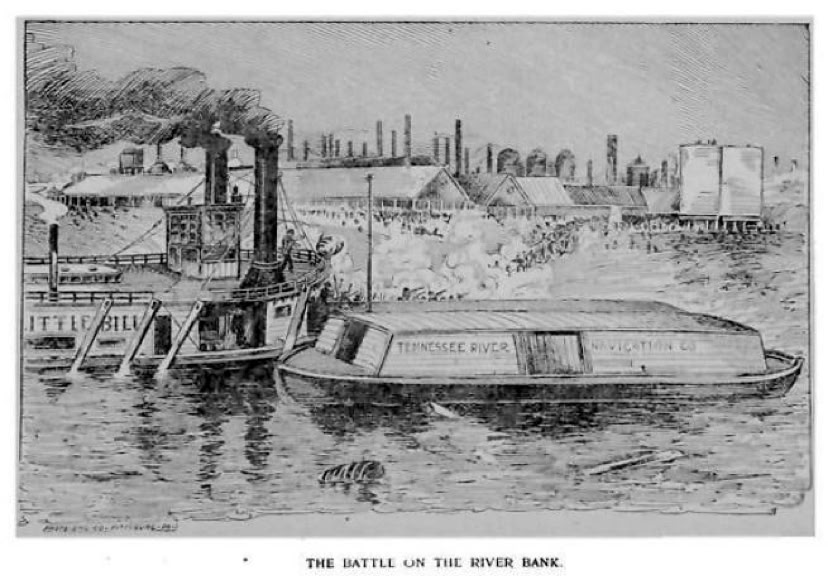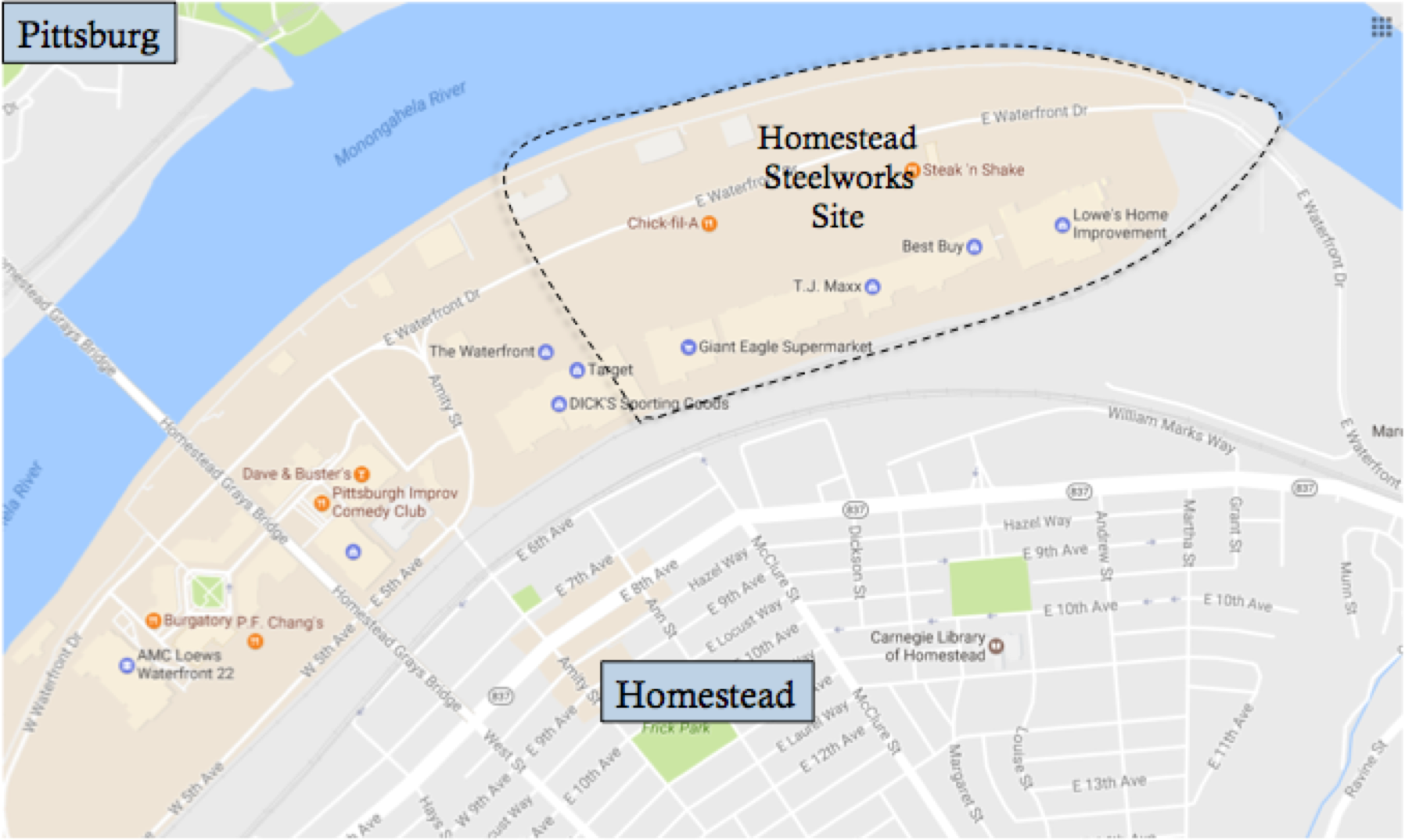The Eckles and Schmitt Families lived in Homestead, PA during the Homestead Steel Strike in 1892







Homestead Steel Mill in Homestead. PA
Inside the Homestead Steel Mill in Homestead. PA
Homestead Steel Mill Workers
Agitated Homestead Steel Mill Workers
The Battle between the Steel Workers and Pinkertons

Burning the Pinkerton’s Barges
Pennsylvania National Guard Arrive
Smoke stacks from the Homestead Steel Works at the Waterfront Shopping Area
Homestead Strike in 1892
Homestead, borough (town), Allegheny county, southwestern Pennsylvania, U.S. It lies across the Monongahela River from the southeastern edge of Pittsburgh and is adjacent to West Homestead and Munhall boroughs. Laid out as Amity Homestead in 1871, the borough developed with the growth of Andrew Carnegie’s steel empire. The steelworks, which later became part of Munhall borough, opened in Homestead borough in 1881.
In the 1880s and 1890s, Andrew Carnegie had built the Carnegie Steel Company into one of the largest and most-profitable steel companies in the United States. The Homestead steel mill, located a few miles from Pittsburgh along the Monongahela River, was one of the largest of Carnegie’s mills. Over the course of the 1880s, several unions were broken at other mills and industrial plants around the country, but in 1892 the workers of the Homestead mill were still represented by the powerful Amalgamated Association of Iron and Steel Workers. Although the union was made up of skilled workers and craftsmen, they were also supported by some 3,000 nonunion workers, who were overwhelmingly eastern and southern European immigrants and their sons.
The contract between the union and Carnegie Steel was set to expire on July 1, 1892, and Carnegie, who was in Scotland at the time, gave his operations manager, Frick, carte blanche to break the union ahead of this deadline. Frick opened his campaign by cutting the workers’ wages. The union, understandably, rejected the wage cut. In late June, Frick responded by locking the workers out and building a massive barbed-wire-topped fence around the plant. The workers dubbed the plant “Fort Frick.” On July 2 Frick fired all 3,800 workers, and during the dark early hours of July 6, a force of 300 Pinkerton agents—private security guards hired by Frick—traveled up the river in two covered barges to occupy the plant.
The workers understood that this was the prelude to replacing them with nonunion labourers, whom they called “scabs.” Thousands of workers and their families stormed the plant before dawn and rushed the pier where the guards were trying to dock. Inevitably, shots were fired, and for the next 12 hours, the Pinkertons and the workers exchanged intense fire. Eventually, the workers accepted the surrender of the Pinkertons, who were led off their barges and to the local jail for protection. However, many Pinkertons were savagely beaten by the crowd along the way to the jail, and the barges they arrived on were burned. Later that night the Pinkertons were released and sent away from the town on a train bound for Pittsburgh. At least three Pinkertons and seven workers were killed during the battle and its aftermath.
The workers then took control of the steel mill, but this did not last long.
Frick asked Pennsylvania Gov. Robert Emory Pattison for help; he responded by sending in 8,500 soldiers of the state National Guard. The plant was turned over to the militiamen on July 12. By July 15 the plant was again operational but with replacement workers.
Public support for the strikers, undermined by the brutal treatment of the surrendered Pinkertons, suffered more damage with an assassination attempt on Frick by Russian anarchist Alexander Berkman, who was not connected to the union, on July 23. In the meantime, waves of criminal charges were lodged against scores of union leaders and workers. Although almost all were eventually acquitted, the charges meant that the union leaders languished in jail, out of touch with their members, as the strikebreaking proceeded.
The conflict between the union workers and the strikebreakers, meanwhile, took on racial overtones in the fall of 1892. The union barred African Americans; many of the strikebreakers, therefore, were African Americans brought in from the South. Given the alternatives they faced in the rural South, the steelworker jobs, even at the lower wages, provided them with a better life. Another riot in November 1892 pitted some 2,000 white workers against African American workers and their families, and several people were severely wounded by gunfire. However, by November 21 the union had given up, and some workers reapplied for jobs at the mill, agreeing to 12-hour days and reduced wages.
The strike directly influenced the reelection of President Grover Cleveland over Benjamin Harrison in 1892, and the strikers’ defeat retarded the unionization of American steelworkers for more than 40 years.
The Homestead Works closed in 1986 and its buildings were torn down in 1993–94. Homestead’s economy is now based on service industries and light manufacturing. The Waterfront shopping area was build on top of the Homestead Steel Works Site because of its central location in the Pittsburg metropolitan area.

Schmitt and Eckles Involvement in the Homestead Strike.
John Schmitt came to Homestead from Sharpsburg, Pennsylvania about 1885. For many years, he conducted the Homestead hotel. In 1890, John was living at 103 Third Street in Homestead, Pennsylvania. Owing to the expiration of his lease and a desire to engage in other business, he opened a fine jewelry store on Sixth Avenue in the room now occupied by McConegly's News depot. One evening the store was entered and a large number of valuable watches and rings stolen. The notorious Fitzsimmons had planned and executed it the robbery. Through an attempt to apprehend Fitzsimmons, County Detective Murphy lost his life, and finally Fitzsimmons committed suicide. John Schmitt's financial troubles date from this occurrence. Shortly before the Homestead strike, John Schmidt obtained a license and fitted up the Amity hotel at the corner of Sixth Ave and Amity Street upon a rather expensive plan. Many of the strangers in town opposed to the strikers made their headquarters at the Amity Hotel owing to the superior accommodations and after the close of the strike, his business failed. He died July 01, 1896.
Thomas Huston Bennet “THB” Eckles was born in 1842 and lived in Homestead, Pennsylvania. He was the oldest of nine children. He married Lucy M. who was born in 1844. THB Eckles owned a Hotel and Restaurant at 246-248 Sixth Ave. When the National Guard was confiscating guns after the Homestead Strike, THB exchanged a gun for a bottle of booze, and we still have three of the those guns (See below). Lucy died on April 20,1907. Thomas died on April 25,1913. They had six children.




Colt Medium Frame Lightning Pump Action Magazine Rifle, .44 Cal, 26” octagonal barrel, blue finish, walnut stock



Carcano Model 1891 “Moschetto” Bolt Action Carbine, 6.7mm, 18 in barrel, european stock with folding bayonet



Winchester Model 1873 Level Action Rifle, 44 Cal, 24 in octagonal barrel, blue finish, walnut stock

Schmitt Family Connection with the Homestead Steel Works
John Schmitt mention earlier on this page was my Great-great-grandfather. He had five children and his second son, Fredrick Schmitt, was my great-grandfather. Fred worked at a hotel and then in the steel mills. He was pit fireman in the Open Hearth Department of the Pittsburgh Crucible Steel Co. All of Fred's sons followed him in the steels mills and worked for a total of 118 years.
1. Elmer Schmidt born in 1911 in Whitaker, PA and worked at the Crucible Steel Company for 40 years and retired as
a supervisor.
2. Charles Schmidt Born in 1914 in Whitaker, PA. He worked in the steel mills and rose to Manager of the Crucible Steel Works.
3. Fred Schmidt born in 1916 in Whitaker, PA and work in the steel mill for a time.
4. Paul Schmidt Born in 1918 in Whitaker, PA. He was employed 43 years at the former Crucible Steel Co. before retiring as a supervisor.
5. Bernard Schmidt born in 1923 in Midland, PA and work in the steel mill for a time.